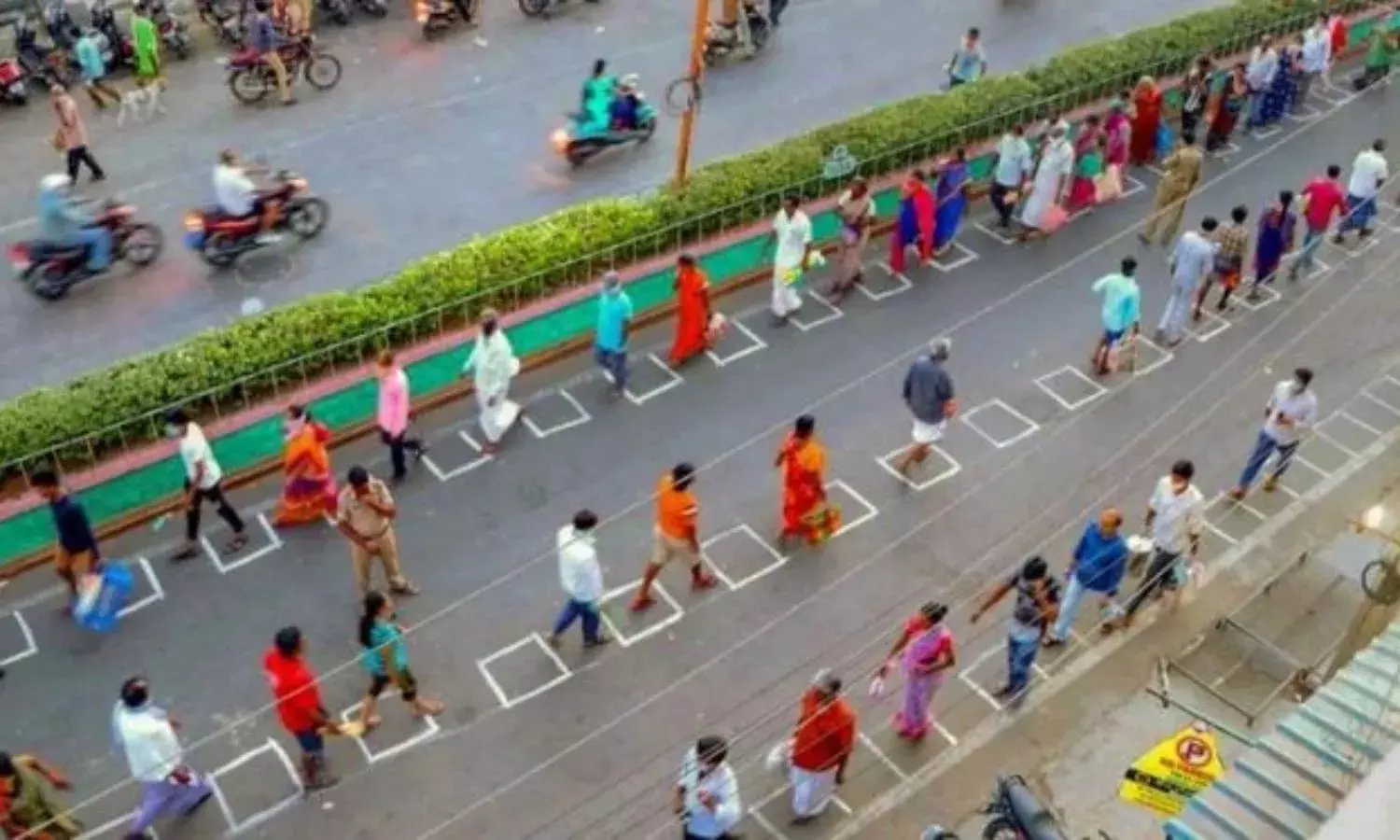Disease Distancing is Not ‘Social Distancing’
‘The poor must be saved from not only disease but also from hunger and thirst’

NEW DELHI: The pandemic of bailouts and public subsidies for large corporations which appear to be so mismanaged they cannot survive a few weeks’ economic shock demonstrates how far the social distance between people and their governments has grown.
The ethical distance is evident, from a report that Varanasi police showed up mid-lockdown at the home of Vijay Vineet, the journalist who had reported starving children were eating grass in prime minister Narendra Modi’s parliamentary constituency. Police reportedly served Vineet notice asking for a “clarification” within 24 hours; it was issued by district magistrate Kaushal Raj Sharma, who went on to circulate pictures of himself eating the grass, to prove it was fit for human consumption.
The distance between word and deed: Doctors in Bihar’s only hospital designated as a coronavirus treatment centre are reportedly working with almost no personal protective equipment, and 83 junior doctors who say they are exhibiting symptoms have been treating patients there for at least five days.
Another report details how the day after India’s first confirmed case in Kerala on January 30, the directorate-general of foreign trade (under the commerce ministry) prohibited the export of all personal protective equipment. A week later it amended the order to allow the export of masks and gloves. On February 25 it further relaxed restrictions and allowed eight new items for export. It seems we kept exporting protective equipment until March 19, and ventilators till March 24.
The distance in priorities can be seen in the central government’s actions in the Supreme Court. Attempts by the government of Kerala to announce a moratorium on taxes and bank dues until April 6 were upheld by the High Court – and a similar order by the Uttar Pradesh government upheld in Allahabad – but were met with resistance from the central government, which challenged the orders in the Supreme Court and won an interim stay ex parte.
The disease distance, however, is more easily breached, as UK prime minister Boris Johnson recently discovered, having tested positive for this virus, spread by the jet-set and quite effectively hidden by the shared commercial interests of the United States, China and other big GDPs.
This disease does not respect caste, source and result to the distances described here.
Our response to this abnormal situation—fomenting a humanitarian crisis—has proven abnormally casteist. And like casteism it is unscientific, for by ordering the poor out of our cities, starving them, not housing them even though all schools and colleges and public buildings everywhere are quite emptied, our incompetent jealous state has made the health emergency much worse.
What is called caste? Ambedkar wrote in 1936 that “Castes form a graded system of sovereignties, high and low, which are jealous of their status and which know that if a general dissolution came, some of them stand to lose more of their prestige and power than others do.”
With the threat of general dissolution well and truly here, the realisation grows: The politics that got us in this mess won’t get us out of it.
‘Social distancing’ will only harm us, lowest and least sovereign first. The distancing measures to avert an epidemic should be called disease distancing, argues social activist and writer Kancha Ilaiah Shepherd in a statement dated January 28 and recirculated recently:
DISEASE DISTANCING NOT “SOCIAL DISTANCING”
Ever since the Prime Minister, Narendra Modi, announced a national lock down on March 24, 2020 to fight Covid-19 and declared that “Social Distancing” is the only solution to save India from the Corona Pandemic, all Chief Ministers are also using the same coinage in India.
We must use ‘Disease Distancing’ not Social Distancing because India is a country of social Untouchability and caste distancing for millennia. If this goes in to the national psyche it will make Untouchability and casteism worse in future. India is not like Europe, America and China. This is a country with millennial practice of social distancing.
Unfortunately the Rastriya Swayamsevak Sangh and Bharatiya Janatha Party claim the biggest organised network in the world. But their cadre are not seen anywhere among the poor, semi-starving labour, beggars across the country when they themselves were ruling.
Mohan Bhagwat and Amit Shah are not seen giving calls to the nation on how to save the poor, unemployed, beggars, nomads and semi-nomads by organizations. No Hindutva organization is seen distributing food, water to beggars, destitute and to the old poor in urban slums. This is a bad nationalism to say the least. Nationalism means saving the poor’s life in a crisis like this.
I request all organizations not to use the phrase “Social Distancing” but use Disease Distancing or Corona Distancing. With great struggles from the days of Savitribai Phule and her son Dr.Yashvantharao Phule who died serving the dying poor in Poona in the Bubonic Plague of 1897, we struggled a lot to fight caste social distancing. We should not be strengthening it again.
The poor must be saved from not only disease but also from hunger and thirst. Let us serve the poorest of the poor like Keralites are doing to save the country.



